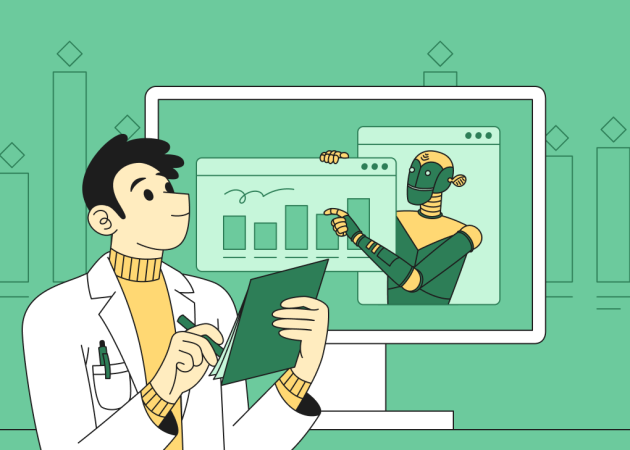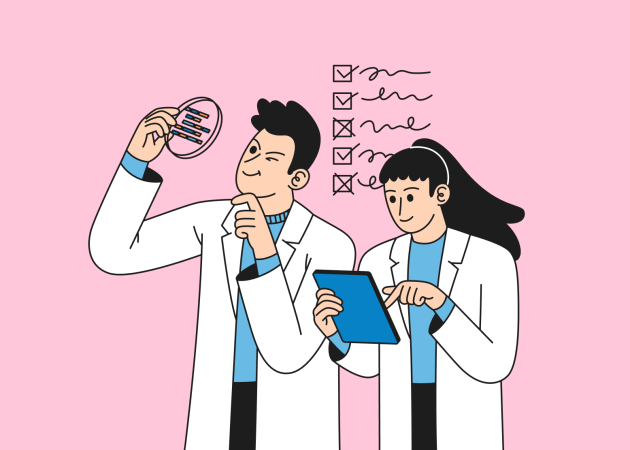
How is NLP Used in Healthcare?
Contents
Contents
Providing healthcare today is not easy. Behind the walls of clinics and hospitals, doctors deal with endless streams of medical data, trying to piece together patient stories and provide the best possible care. Nurses deal with severe burnout, juggling the demands of administrative tasks with the urgent needs of their patients. Meanwhile, patients, more informed than ever, set higher expectations for care (and rightfully so). In this environment, Natural Language Processing technology (NLP) promises to become a reliable assistant for both medical workers and patients, offering a solution to pressing issues, at least partially.
As a company that specializes in developing software solutions for the health tech industry, Beetroot is eager to explore how NLP can help deal with the challenges by bridging the gap between human language and computer understanding. In this article, we’ll explore the importance of NLP in healthcare these days by going over the core benefits and use cases. We’ll also address the challenges of NLP adoption, as well as share our own experience with the technology. So, if you’re looking for ways to optimize healthcare-related operations at your organization — read on.
Natural Language Processing in Healthcare
Natural Language Processing (NLP) is a branch of artificial intelligence that enables computers to understand, interpret, and generate human language. Basically, NLP algorithms analyze text data to recognize patterns, understand context, and derive meaning, allowing for various applications, from automated summary generation to question-answering systems.
But what is NLP in healthcare? In clinical settings, NLP helps automate the analysis of vast amounts of text data, including electronic health records (EHRs), medical literature, and patient feedback. It has the potential to streamline patient care, enhance treatment discovery, and personalize medical services. Key applications like sentiment analysis, entity recognition, and drug discovery highlight NLP’s growing impact in extracting valuable insights and driving innovations in the sector.
In 2022, the global NLP in the healthcare and life sciences market reached $3.75 billion in value according to Precedence Research. By 2032, it is expected to be worth around $42.34 billion, growing at a CAGR (compound annual growth rate) of 27.43%.
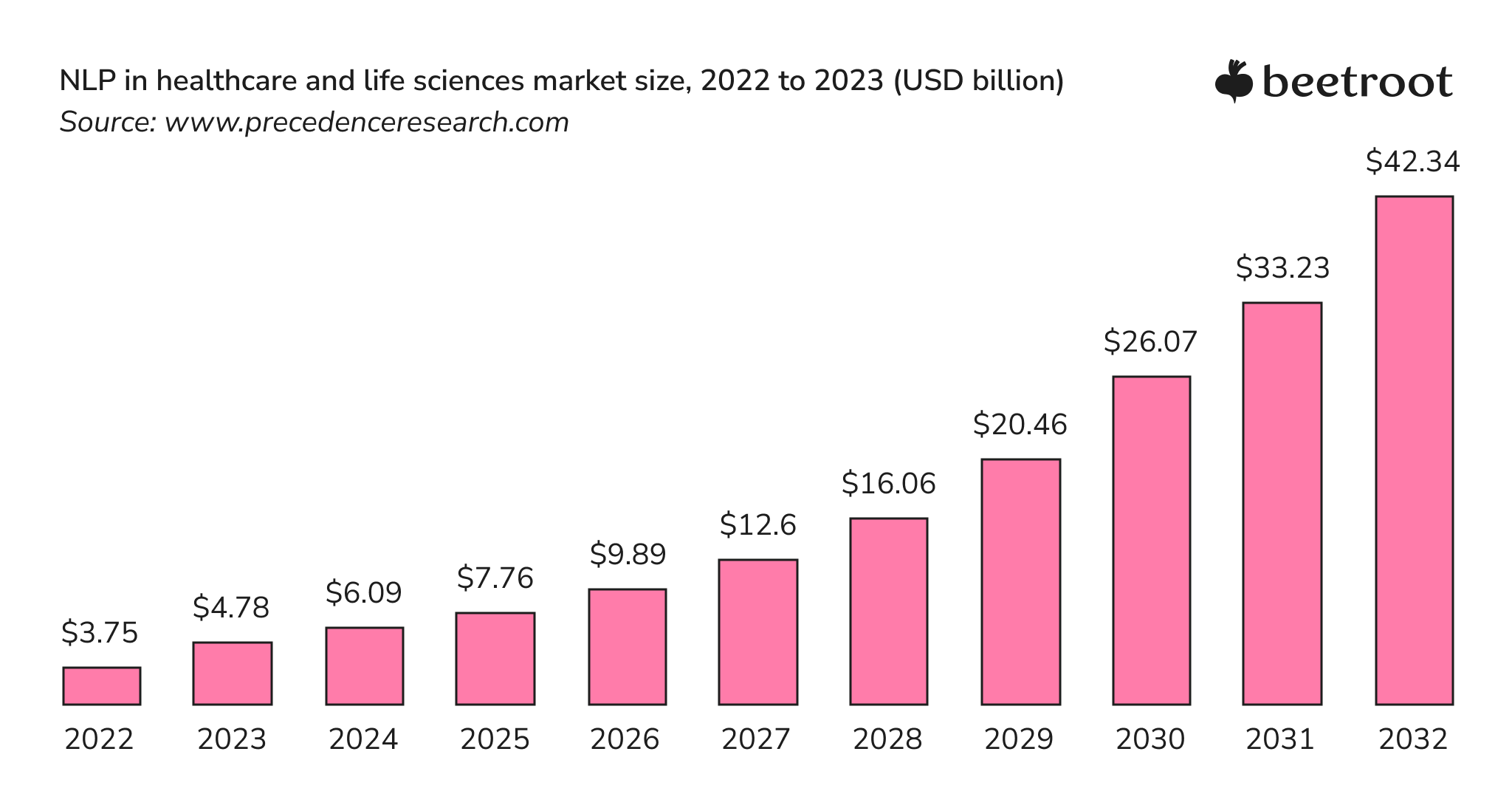
The key driver behind the growth of NLP in healthcare is the need for accurate processing of large volumes of unstructured data. This information includes electronic health records, clinical notes, medical literature, research, and more. NLP is used to extract and convert all this data into a structured format, identifying key medical insights to enhance patient care and support clinical decisions.
You will find more about the use cases further in the article.
Benefits of NLP in Healthcare
NLP technology’s biggest strength is its ability to process, understand, interpret, and generate human language. Let’s see which practical benefits it leads to in the healthcare settings.
Organizing Unstructured Data
The vast majority of healthcare information exists in formats that are not straightforward to analyze. In fact, around 80% of industry data is unstructured. That’s one of the challenges NLP addresses, serving as a translator and converting unstructured data into a form that’s easy to understand and use for medical professionals. For example, NLP can transform handwritten notes into digital text, making patient histories more accessible for different providers. This helps save time and ensure no critical detail is overlooked.
Improving Analytics Accuracy
Successful patient outcomes depend on the accuracy of data analysis used in decision-making. NLP provides healthcare professionals with a quicker and more efficient way of analyzing vast amounts of medical data, leading to more precise healthcare insights. To be more specific, NLP-enabled tools can detect subtle patterns in patient records that may indicate the early stages of a disease, allowing for timely interventions. Even in 2016, researchers already found that an NLP-powered algorithm identified at-risk patients of Kawasaki disease with a sensitivity of 93.6% and specificity of 77.5%. As NLP evolves, the level of accuracy will only continue to grow.
To highlight the significance of natural language processes in real-life healthcare projects, we talked to Vira Lamtieva, Beetroot’s domain expert for the AI Genomics Platform, whom we engaged in the project per our client’s request:
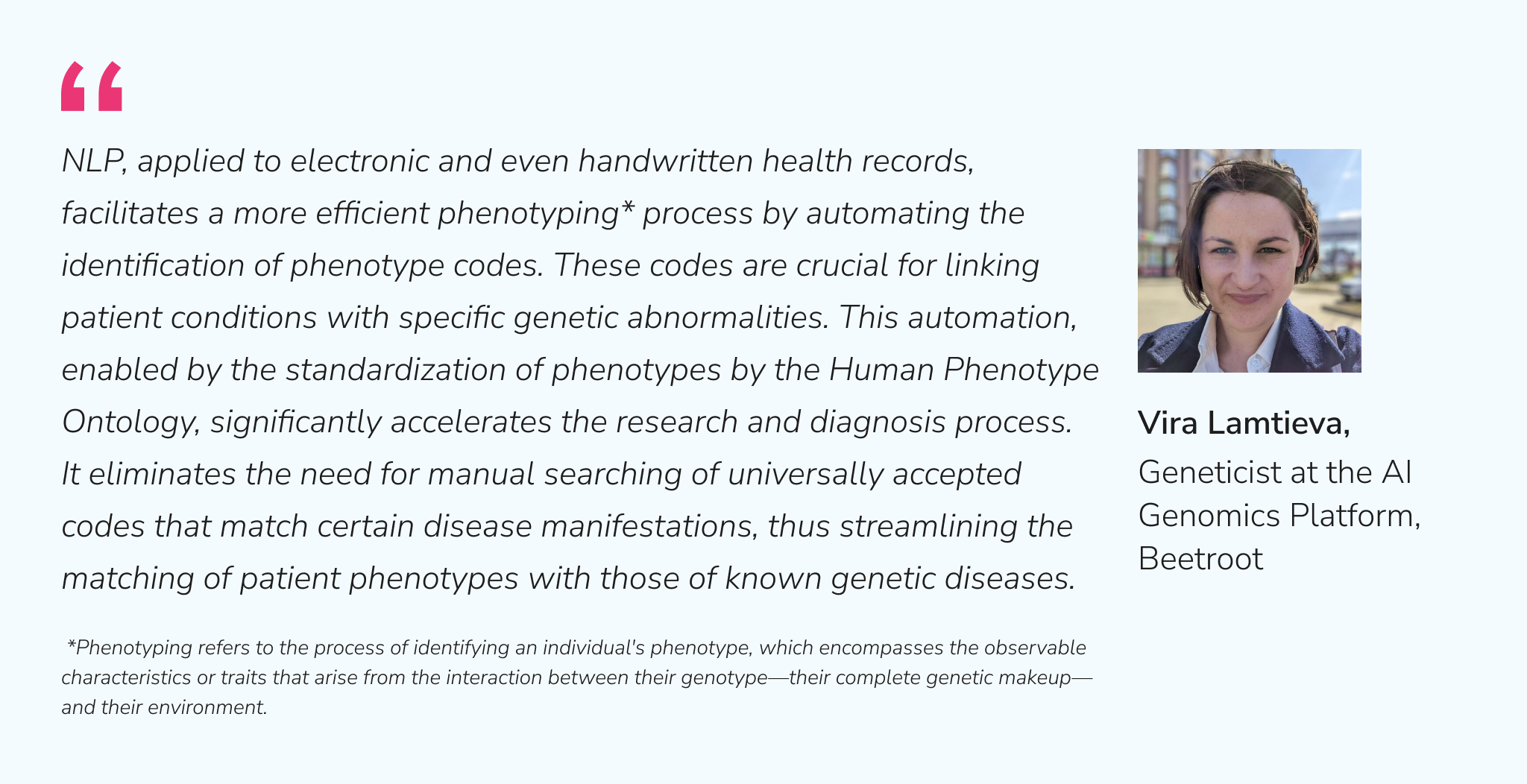
Facilitating Informed Decision-Making
Physicians and nurses have to make countless daily decisions, all under the pressure of knowing these decisions impact patients’ lives. NLP-powered tools can serve as a support system for medical professionals by offering up-to-date, evidence-based recommendations based on medical data, such as research, guidelines, patient records, and more. While humans will still be the ones making final decisions, the technology will help them speed up the process while making sure these decisions are knowledge-based and comprehensive.
Here is what Vira Lamtieva says about this advantage of NLP:
“NLP automatically extracts from biomedical literature entities such as genes, genetic variants, phenotypes, conditions and treatments, and, most importantly, relationships between them. Thus, NLP scales literature mining for gene-disease connections and evidence-based clinical recommendations.”
Enhancing Patient Communication
With health tech advancements, patients feel more empowered and informed than ever. This means they expect clear, timely, and personalized communication from their healthcare providers. With NLP, medical facilities can meet this demand on a large scale faster and more efficiently. For example, chatbots and virtual assistants can handle a wide range of patient queries, from appointment scheduling to medication intake instructions. By providing instant access to information, healthcare providers get an opportunity to build stronger, more trustworthy relations with their patients.
Reducing Costs
Healthcare organizations often face the pressure to provide excellent care while also making it accessible, all when dealing with budget limitations. NLP comes in as a way to automate routine tasks, specifically administrative ones such as data entry. This approach gives the opportunity to both speed up response times and allows medical workers to focus on higher-value tasks. As a result, this can lead to significant cost savings. For example, by 2026, virtual NLP-powered nursing models are projected to cut US healthcare expenses by $20 billion. This highlights the long-term cost benefits of NLP in healthcare.
Use Cases of NLP in Healthcare
The integration of natural language processing technology into healthcare is changing the way medical professionals interact with data, make decisions, and ultimately care for patients. Below, we explore the most common NLP applications in healthcare.
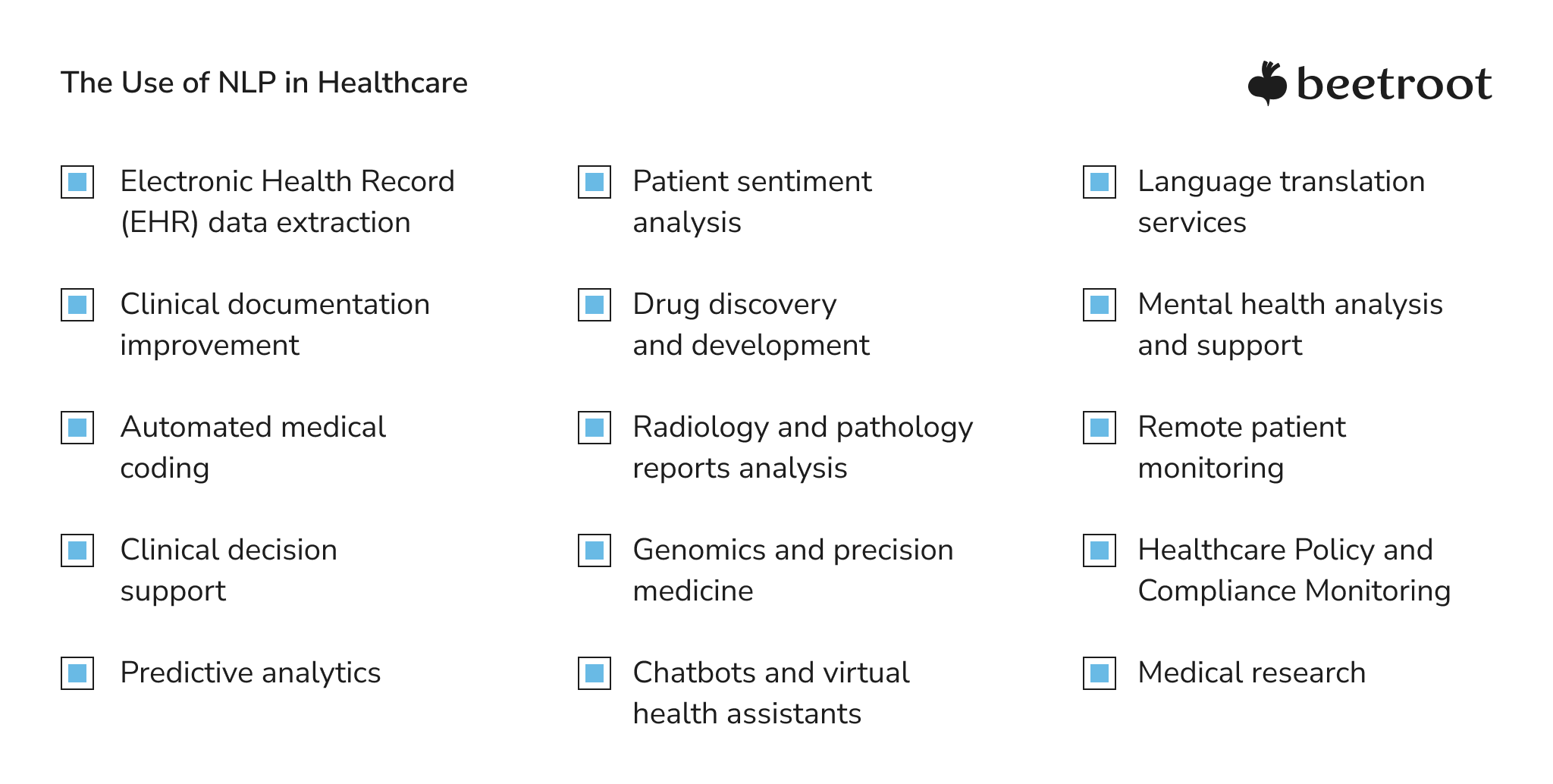
| Electronic Health Record (EHR) data extraction | NLP simplifies the extraction of vital information from EHRs, enabling healthcare providers to quickly access patient histories, diagnoses, and treatment plans. |
| Clinical documentation improvement | By analyzing clinical documents, NLP systems help identify inaccuracies and inconsistencies, ensuring high-quality, detailed patient records. |
| Automated medical coding | NLP streamlines the medical coding process, translating clinical documents into standardized codes for billing and reporting, reducing errors and saving time. |
| Clinical decision support | Integrating NLP with clinical decision systems assists in interpreting patient data, offering real-time insights and recommendations to healthcare professionals on how to improve patient care. |
| Predictive analytics | NLP uses historical health data to forecast future health outcomes, allowing for proactive patient management and resource allocation. |
| Patient sentiment analysis | Analyzing patient communication, NLP identifies sentiments and concerns, offering healthcare providers insights into patient satisfaction and areas for improvement. |
| Drug discovery and development | NLP accelerates drug research by mining scientific literature and databases for relevant information, enhancing the efficiency of drug development processes. |
| Radiology and pathology reports analysis | NLP helps analyze radiology and pathology reports to identify key findings, assisting radiologists and pathologists in making accurate diagnoses. |
| Genomics and precision medicine | By processing genetic information, NLP contributes to personalized medicine, linking genetic variations to diseases and offering tailored treatment plans. |
| Chatbots and virtual health assistants | NLP-powered chatbots and assistants provide 24/7 support, answering health-related questions, offering personalized advice, and improving patient engagement. |
| Medical research | NLP facilitates medical research by efficiently sorting through vast amounts of scientific literature to extract relevant data and insights, speeding up discoveries. |
| Language translation services | NLP provides translations of medical documents and patient communications, ensuring clear understanding regardless of language. |
| Mental health analysis and support | Analyzing speech and text, NLP identifies patterns that indicate mental health issues, thus assisting in early detection and personalized support strategies. |
| Remote patient monitoring | NLP enhances remote monitoring systems by interpreting patient-reported outcomes and feedback, ensuring timely intervention and personalized care management. |
| Healthcare Policy and Compliance Monitoring | By monitoring and analyzing healthcare regulations and compliance documents, NLP tools help organizations stay updated and avoid regulatory issues. |
The Potential of NLP Technology in Healthcare
The potential of natural language processing in healthcare is nearly immeasurable, offering transformative solutions for patient care, research, and administrative efficiency. NLP allows healthcare providers to make sense of the vast amount of unstructured data found in medical records and communications, helping them get valuable insights. So, what’s next for this technology?
One of the most promising types of NLP is the rule-based segment, which is expected to dominate the market due to its precision and ability to adapt to domain-specific requirements. It uses set linguistic rules to process text and is especially useful in the highly regulated medical industry for extracting precise information and aiding in clinical decisions. For instance, in clinical settings, a rule-based NLP system can be used to extract specific details from patient records, such as medication names, dosages, and diagnostic codes, based on predefined linguistic rules.
The hybrid NLP segment, which combines these rules with data-driven algorithms, is also predicted to grow. This approach helps deal with the complex and varied nature of medical texts, making it perfect for tasks like clinical documentation and extracting information from medical records and biomedical texts. A hybrid NLP system could analyze a broader range of clinical documentation to identify trends or anomalies that might not be immediately apparent. For instance, it could sift through notes from various healthcare providers to obtain a comprehensive view of a patient’s condition, even if the terminology varies between documents.
The future of NLP in healthcare looks extremely promising. The technology is expected to help doctors diagnose and treat patients faster and more accurately while also catching diseases earlier. Plus, it’ll predict health trends to keep us ahead of outbreaks. NLP will also cut down on paperwork, giving healthcare workers more time with their patients.
The Biggest Challenges of NLP in Healthcare
Using NLP in healthcare could immensely enhance operational efficiency for healthcare organizations. However, it also comes with challenges that must be tackled first. Each of them is manageable, though, with an experienced tech team by your side.
| Challenge | Solution |
|
Linguistic complexity The extremely nuanced and complex nature of the human language, which makes it challenging for the NLP system to interpret it correctly |
Following the experience of other healthcare organizations and testing different NLP algorithms in real-case scenarios to choose the most advanced models suitable for the medical context |
|
Privacy and security concerns The highly sensitive nature of patient data, which makes it vulnerable to the risks of data leaks and cyberattacks |
Implementing robust data encryption and access control measures, as well as conducting regular internal and external security audits, to ensure patient data is secure and complies with regulations |
|
Interoperability issues The lack of compatibility between different healthcare systems and data formats, hindering NLP’s effectiveness |
Adopting universal healthcare data standards and promoting system interoperability to facilitate smoother NLP integration |
|
Lack of standardization in clinical language Inconsistent use of medical terminology across documents and systems, which makes NLP analysis challenging |
Creating and enforcing standardized clinical terminologies to improve the accuracy of NLP applications |
|
Cost of implementation The high initial investment required for NLP technology, especially when integrated with legacy systems |
Leveraging cloud-based NLP services and scalable solutions to reduce upfront costs and make implementation more affordable |
Beetroot Insights About NLP in Healthcare
One of the reasons why Beetroot is invested in this topic is our involvement in the R&D project Speak’n’Hear, a mobile app designed to facilitate communication for people with hearing and speech disabilities. The platform serves as a tool for transcribing audio, synthesizing speech, and recognizing speech in text format to improve social interaction and reduce communication challenges for users. So, naturally, it required NLP-powered solutions.
Initial Challenge
When we started working on Speak’n’Hear, there were several tech challenges. First, the app had to integrate advanced speech recognition and text-to-speech technologies, ensuring they work harmoniously without compromising performance. Given the diverse user base and unique communication needs, getting translations right in real time for different languages and dialects was especially important.
Developing an intuitive user interface that caters to the varied abilities and preferences of deaf users and those with speech impairments presents a complex design challenge. Balancing technological sophistication with ease of use and accessibility remains a key focus for the development team.
Our Solution
Speak’n’Hear offers a comprehensive solution tailored to its diverse user base:
- For deaf users, it provides speech recognition, transforming spoken language into text and making conversations more accessible;
- Users with speech challenges have access to a text-to-speech feature, enabling them to communicate verbally through typed text;
- Users with hearing and speech impairments can benefit from the translation of medical records, ensuring they don’t need to rely on someone else’s assistance to understand the results. The application allows for the conversion of numerical data into explanatory text.
Technologically, the app stands out with its ability to save conversation histories at the user’s request, enhancing user experience and providing a reference for past communications. It offers personalized settings, allowing users to indicate their specific needs.
Performance-wise, Speak’n’Hear is designed to handle multiple users simultaneously with a response time for speech recognition and text-to-speech features of less than two seconds. This technical proficiency is coupled with robust safety and security measures, including encrypted user data and secure server communication.
To deal with the tech challenges, our mobile development team’s key technologies are Flutter, ASP.NET, OpenAI Whisper.
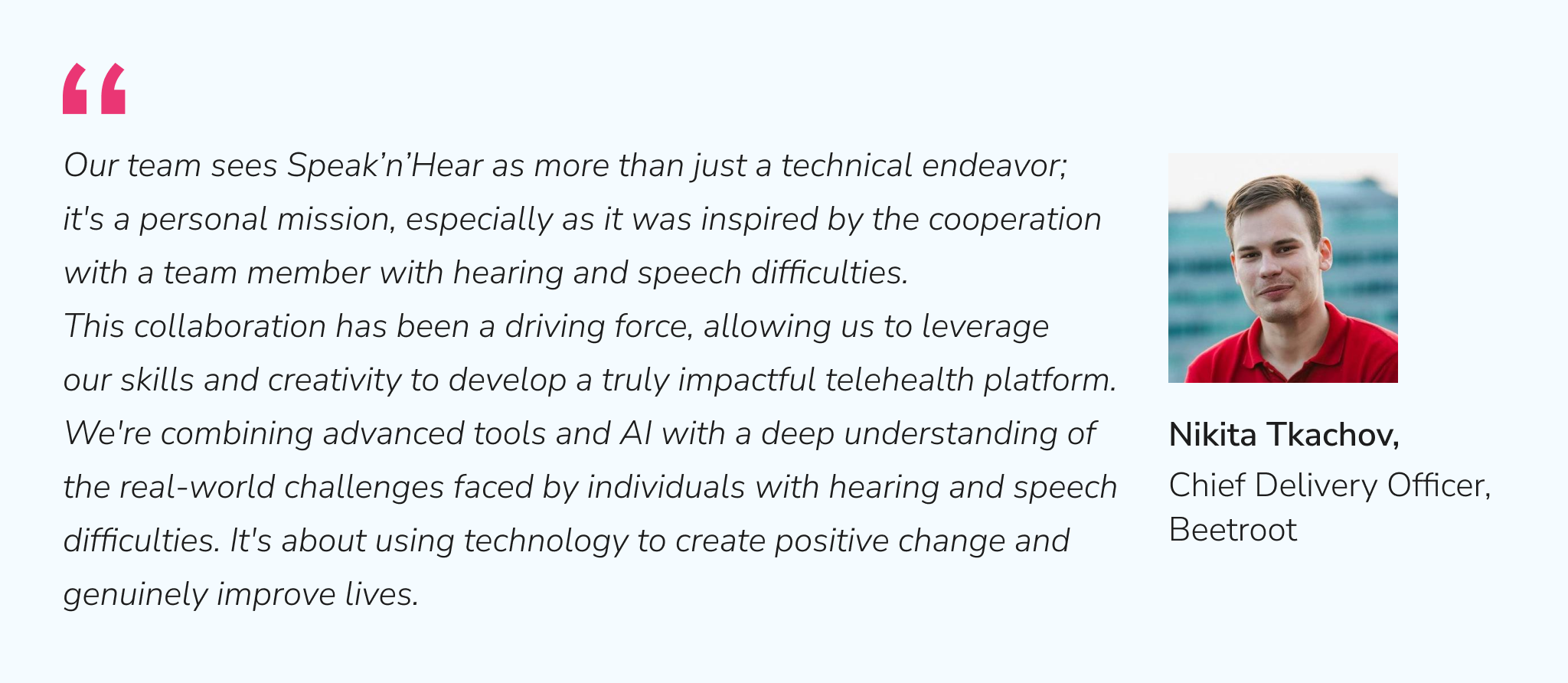
Navigating the New Frontiers of Healthcare with NLP
Integrating NLP into healthcare technology is changing how we care for patients, making things faster and more accurate. NLP helps sort through tons of data quickly, helping doctors and healthcare workers make better decisions in less time. However, since NLP is still quite new and rapidly evolving, it’s important to use it wisely, just like any other AI-based technology.
If all this sounds a bit overwhelming, remember you’re not alone. There are experts who have expertise in applying NLP in healthcare and can help you figure out the best way to use it. If you need guidance on how to make NLP work for you, reach out to Beetroot. Our team of experts is here to help navigate the challenges and make the journey rewarding.
Subscribe to blog updates
Get the best new articles in your inbox. Get the lastest content first.
Recent articles from our magazine
Contact Us
Find out how we can help extend your tech team for sustainable growth.


